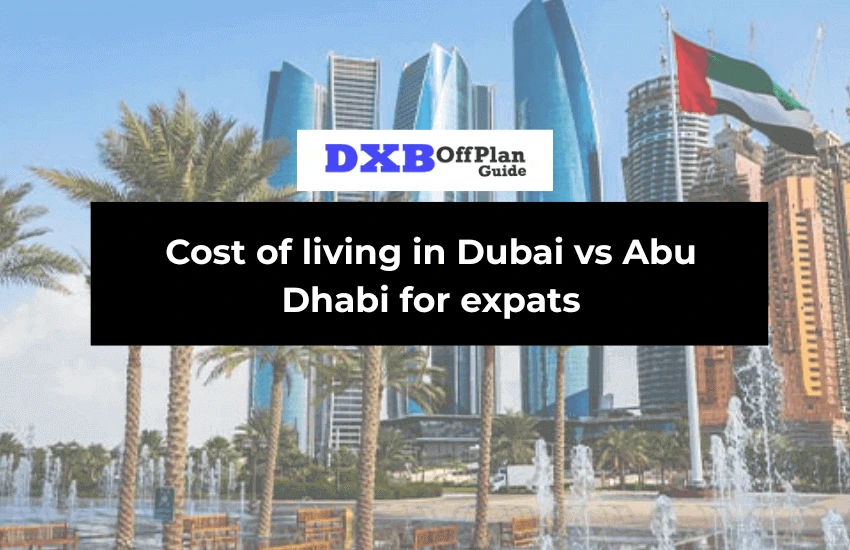Dubai vs Abu Dhabi Cost of Living The Ultimate 2025 Expat Breakdown
Choosing between Dubai and Abu Dhabi is one of the most significant decisions a UAE expat can make. While both offer tax-free salaries and incredible opportunities, the cost of living differs dramatically and will directly impact your savings and lifestyle. This isn’t about which city is cheaper; it’s about which offers better value for your specific needs. Our definitive guide uses the latest market data to give you a clear financial picture.

The Bottom Line Up Front which City is More Expensive?
According to recent industry reports and cost-of-living indexes, Abu Dhabi is generally 5-10% more affordable overall than Dubai, primarily driven by lower rental costs in comparable neighborhoods. However, this is a generalization. Dubai offers a wider range of costs, with more budget-friendly options available in its outer communities. Your personal spending on housing, schooling, and transportation will ultimately determine which city is cheaper for you.
Housing Showdown Rent and Property Prices
Housing will be your largest monthly expense. This is where the most significant differences lie.
Rental Costs: Abu Dhabi’s Advantage
-
Abu Dhabi: Offers more competitive pricing for high-quality housing in prime central areas like Al Reem Island and Al Raha Beach. You can often get more square footage for your budget compared to Dubai.
-
Dubai: Premium addresses like Dubai Marina and Downtown Dubai command some of the highest rents in the UAE. However, Dubai also offers more affordable options in communities like Jumeirah Village Circle (JVC) or Dubai South.
The Verdict: For comparable luxury, Abu Dhabi wins on rental value. Dubai wins on the diversity of options.
Education: The Cost of International Schools
If you have children, school fees will be your second-largest expense. Both cities have world-class but costly international schools.
-
Average Annual Fees: Tuition for top-tier British, American, and IB curriculum schools is notoriously high in both emirates, often ranging from AED 40,000 to AED 90,000+ per child per year.
-
Key Difference: There is no significant price differential between the two cities for equivalent-tier schools. The choice will be based on curriculum availability and specific school reputation rather than cost savings.
Transportation: Driving vs. Public Transit
How you get around has a major impact on your monthly budget.
Car Ownership Costs
Costs are nearly identical. Both require vehicle registration, insurance, and fuel. Petrol prices are federally set, so fuel costs the same in both emirates.
Public Transportation
-
Dubai has a significant advantage with its extensive, modern, and affordable Dubai Metro, tram, and bus network. This can allow some residents to live without a car, creating substantial savings.
-
Abu Dhabi has a reliable bus system, but its network is less comprehensive than Dubai’s. Most expats find a car is essential for convenient living in Abu Dhabi.
Lifestyle and Leisure: Dining, Entertainment, and Utilities
Day-to-day living costs are similar, but the lifestyle offerings differ.
-
Dining and Groceries: Supermarket prices are nearly identical. Eating out at similar-tier restaurants will cost roughly the same in both cities.
-
Entertainment: Dubai offers a much wider and often more affordable array of entertainment options, from beach clubs and global events to budget-friendly food festivals. Abu Dhabi’s offerings are often perceived as more high-end and can be costlier.
-
Utilities (DEWA vs. ADDC): Utility costs for water and electricity are broadly comparable, with minor variations in tariff structures that typically balance out over a year.
The Hidden Factor: Lifestyle and Value Proposition
The cost analysis is incomplete without considering what you get for your money.
-
Dubai: Pays for buzz and convenience. You’re paying for the endless options, the 24/7 energy, the convenience of having everything at your doorstep. It’s a price paid for excitement and choice.
-
Abu Dhabi: Offers a calmer, more settled lifestyle. The value is in a more relaxed pace of life, often with less traffic, and a strong focus on community living, particularly for families.
Who Should Choose Which City? A Data-Driven Verdict
-
Choose Dubai if: Your priority is career networking, a vibrant social scene, and unparalleled convenience. You are willing to pay a premium for a dynamic, fast-paced lifestyle and may prioritize luxury lifestyle communities in Dubai with top amenities
-
Choose Abu Dhabi if: Your priority is maximizing savings on rent, you prefer a quieter, more family-oriented environment, and you value a shorter commute. The proven value of housing is your key driver.
Frequently Asked Questions
Q1: What is the biggest cost difference between Dubai and Abu Dhabi?
The single biggest cost difference for most expats is housing rental prices. For equivalent quality and location, Abu Dhabi generally offers more competitive rental rates, making it the more affordable option for accommodation.
Q2: Is a salary of AED 15,000 enough to live in Dubai or Abu Dhabi?
A salary of AED 15,000 per month is manageable but will require a careful budget, especially if supporting a family. Abu Dhabi may be slightly easier on this budget due to lower average rent. Living in shared accommodation or Dubai’s outer suburbs would be necessary.
Q3: Can I live in Abu Dhabi and work in Dubai, or vice versa?
While possible, the daily commute between the two cities is long (60-90 minutes each way) and costly in terms of fuel and vehicle wear-and-tear. This commute is generally not sustainable long-term and is not recommended for most people.
Q4: Which city has better public transportation?
Dubai has a far superior and more comprehensive public transportation system, including the extensive Metro, Tram, and bus network. This can significantly reduce living costs by allowing residents to forego car ownership.
Q5: Are groceries more expensive in Dubai or Abu Dhabi?
The cost of groceries is nearly identical in both emirates. Major supermarket chains operate in both cities with federally influenced pricing on many items, so your grocery bill will be consistent regardless of which city you choose.
Q6: How do utility costs (water, electricity, cooling) compare?
Utility costs are broadly similar. Both Dubai Electricity and Water Authority (DEWA) and Abu Dhabi Distribution Company (ADDC) have tiered tariff systems. Overall, an average household’s utility bills will be comparable for a similar-sized villa or apartment in each city.





Leave a Reply